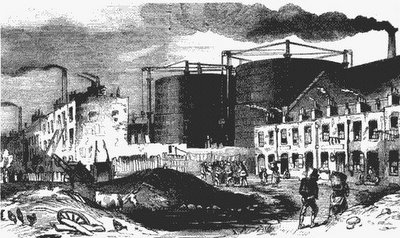VICTORIA is an online community of 19th-century scholars and other interested folk, covering mainly literature and history but with lots of other input, of which I've been a grateful listmember for something like 15 years. Established, maintained, and run with a light hand by the wonderful Patrick Leary, VICTORIA has been characterised all its life by the courtesy, intelligence, literacy and erudition of its posts and threads, so it should be needless to add that I mostly lurk and admire in silence, but these days its civilised qualities make it a quite unusual online place to be.
So, turning to it this morning for some badly-needed perspective and quietness of mind, I was rudely reminded by this post from Bob Lapides of what the 19th century, especially in its early days, was actually like. The phrase 'blacking days' refers to Dickens' stint, at age 12, at work in a boot-blacking factory after his father had been imprisoned.
When his father was arrested for debt in 1824, Charles Dickens
(then 12) had to appear before an appraiser to make sure his
personal property had a value of less than twenty pounds. In a
piece of autobiography he wrote some years later, he described
his anxiety about a silver pocket watch his grandmother, Lord
Crewe's housekeeper, had given him:
"I recollect his coming out to look at me with his mouth full, and
a strong smell of beer upon him, and saying good-naturedly that
'that would do,' and 'it was all right.' Certainly the hardest creditor
would not have been disposed (even if he had been legally entitled)
to avail himself of my poor white hat, little jacket, or corduroy
trowsers. But I had a fat old silver watch in my pocket, which had
been given me by my grandmother before the blacking days, and I
had entertained my doubts as I went along whether that valuable
possession might not bring me over the twenty pounds. So I was
greatly relieved, and made him a bow of acknowledgment as I went
out."

4 comments:
Ahem. Link?
I've always found Dickens a little too mawkish on the subject of his own childhood. One suspects that it was the social degradation rather than the physical hardship which really stung the sensitive lad.
That said, I rather enjoyed Little Dorrit, which is embarassingly sentimental and possessed of an inhumanly angelic heroine facing similar circumstances.
I take it you mean 'link to VICTORIA' and should have explained -- might edit post & do that -- it's an email discussion list that one joins by subscribing, not a website or blog, so there is no link to be lunk.
As for Dickens -- I think at that point the poor poppet was just in shock. And in a permanent state of exasperation with his father.
Always interesting to see where the word 'poppet' turns up...I have a 28 yo friend here who uses the word 'poppet' regularly. It seems the 'poppet' is not dead!
The other tortoiseshell is called Poppet; the Catavar supermodel is Madam. I watched them for a week after I brought them home to see if any names would suggest themselves, and at the end of the week I was saying things like 'Get down off the dining table, you little madam, this lamb chop is mine, I tell you, mine' and 'Come out from behind the piano, poppet, the nasty eggnisher man has gone.'
'Poppet' (poppet/puppet/doll is one of the etymological chains, I think) for me has connotations of innocence and defencelessness, laced with non-OTT cuteness, but I believe it also has some quite sinister voodoo-related meaning.
Post a Comment